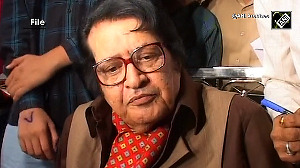The capital city of Delhi is set to shed its old and ugly skin to give way to a shiny new world-class avatar for the Commonwealth Games. This is no cosmetic touch-up job but a multi-thousand crore rupees makeover, which will ensure that the 16 million-odd residents of the city forget that they ever faced any shortages of the basic kind (think power, water, transport, medical facilities) and instead enjoy the abundance of aesthetics.
"Come out and play" is what Delhi is going to exhort you, and the world to do, in about 800 days from now, when the games kick off.
Delhi will be a clean city, a green city, a street-scaped city (a new buzz word in the Delhi secretariat) embellished with street furniture, signages and lots of green cover.
Its games infrastructure will be overhauled and it will boast a prestigious commonwealth games village, flanked by the Akshardham temple on one side and the Yamuna river on the other.
There are no easy estimates of what the city is spending on itself since it is being funneled through various ministries at the Centre, and at the state level. One "conservative" estimate given by the Delhi government is Rs 65,000 crore (Rs 650 billion), of which over half is for the new power plants that are in the offing.
The other big-ticket heads for expenses are the metro (Rs 17,000 crore or Rs 170 billion), flyovers and bridges (Rs 6,500 crore or Rs 65 billion), a new bus system (Rs 1,518 crore or Rs 15.18 billion) and water supply (Rs 1,000 crore or Rs 10 billion).
Some of this money would have been spent on the city's creaking infrastructure anyway but the games have expedited programmes which would been stretched over the next few years.
In fact that is the precise reason that cities pitch to host games -- it fast-forwards the local infrastructure development, says Mike Hooper, the chief executive officer of the London-based Commonwealth Games Federation, which conduct the games across the world.
Fast-forward is, however, what Hooper did not see a few months ago when he was visiting Delhi with his boss -- CGF President Michael Fennel. Things have changed since then and most officials admit that the pace of activity has really picked up in the last few months. "For most of the city infrastructure, work is going on ahead of schedule," says Delhi Chief Secretary Rakesh Mehta.
Activity had to pick up since not being ready is not an option. "India cannot fail. It is not a choice. If we have taken responsibility, we have to deliver," says the two-month-old Sports Minister Manohar Singh Gill. Things seem to have picked up since he took over and activated the coordination committee to get all the stakeholders talking to each other, and more importantly, working in tandem with each other.
The Commonwealth Games is now an "India project", rather than a Delhi project, and that may be a blessing given the almost unlimited budgets that are on demand. "Every cost is going up," explains Gill.
But that apparently is the case with every other international gaming event. The cost of the 2012 London Olympics, for instance, is reported to have bloated to $18 billion -- three times the original estimate. So Gill has already warned cabinet colleagues that he would be seeking additional funds, and seeking their disbursal promptly.
Funds will also be coming in from the games, though mostly to the games organising committee headed by Suresh Kalmadi. The Committee had earlier projected a revenue surplus from the games but most officials now expect it to be a revenue-neutral exercise with the cost of organising the games -- last estimated at over Rs 1,600 crore -- being met by ticket sales, advertising revenue and broadcast rights.
The main games will be preceded by the Commonwealth Youth Games slated to kick off in Pune in about 80 days. Brands that have already signed on for the Baton Relay for these games, starting on August 1, include Tata Motors, Kinley water and Air India.
"The Commonwealth Youth Games will set the stage for a great commonwealth games and they will lead us to a great Olympics," says Kalmadi, who is keen to pitch India as a host for the 2020 Olympics. Perhaps this time we will be able to show the world that planned development works!







 © 2025
© 2025